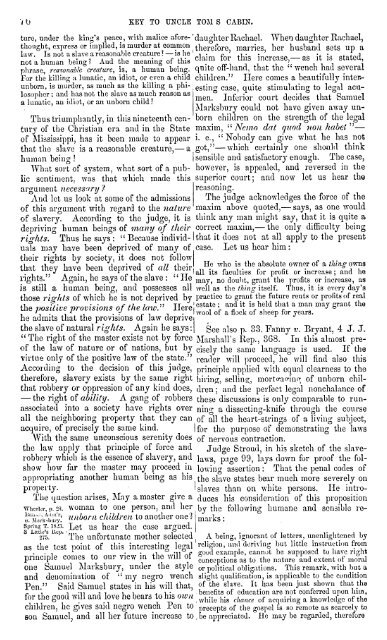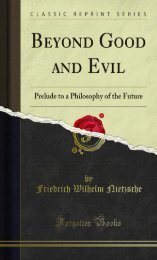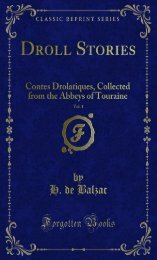UNCLE TOM'S CABIN
1iw97FV
1iw97FV
- No tags were found...
You also want an ePaper? Increase the reach of your titles
YUMPU automatically turns print PDFs into web optimized ePapers that Google loves.
" the<br />
KEY TO <strong>UNCLE</strong> TOM S <strong>CABIN</strong>.<br />
ture, under the king'speace, with malice aforethought,<br />
daughter Rachael. When daughterRachael,<br />
express<br />
or implied, is murder at common<br />
therefore, marries,her husband<br />
"<br />
law. Is not a slave a reasonable creature? ishe<br />
sets up a<br />
"<br />
claim for this<br />
not a human being1 And the meaningof this<br />
increase, as it is stated,<br />
phrase,reasonable creature,is, a human being. quiteoff-handțhat the " wench had several<br />
For the killing a lunatic,an idiot,or even a child children." Here comes a beautifully interesting<br />
unborn, is murder,as much as the killing<br />
a philosopher<br />
case, quitestimulating to legal acumen.<br />
; and has not the slave as much reason as<br />
Inferior court decides that Samuel<br />
a lunatic,an idiot,or an unborn child?<br />
Thus triumphantly, in thisnineteenth century<br />
of the Christian era and in the State<br />
of this argument with regardto the nature<br />
rights. Thus he says : "<br />
Because individ-<br />
may have been deprived of many of case. Let us hear him :<br />
their rightsby society, it does not follow<br />
that they have been He who is the absolute owner of<br />
deprived of all their<br />
a thing owns<br />
rights."Again, he all its faculties for profit<br />
says<br />
of the slave: "He<br />
or increase ; and he<br />
is stilla human being, and possesses all may, no doubt,grant the profits or increase,as<br />
well as the thing itself. Thus, it is every day's<br />
those rightsof which he is not deprivedby practice to grant the future rents or profits<br />
real<br />
the positiveprovisionsof the law." Here estate ; and it is held that a man may grant the<br />
wool of a flock of sheep<br />
he admits that the provisions of law deprive<br />
for years.<br />
of slavery Ạccording to<br />
think any<br />
man might say,<br />
that it is quite a<br />
depriving human beings of many of their correct the maxim," onlydifficulty being<br />
uals that it does not at all applyto the present<br />
the judge, it is<br />
the slave of natural rights.Againhe says :<br />
"<br />
The right of the master existsnot by force<br />
of the law of nature or of nations, but by<br />
virtueonly of the positive law of the state."<br />
According to the decision of this judge,<br />
therefore, slavery exists by the same right<br />
that robbery or oppression of any<br />
kind does,<br />
rightof ability Ạ gang of robbers<br />
associated into a society have rightsover<br />
all the neighboring property that they can<br />
acquire, of precisely the same kind.<br />
With the same unconscious serenity of force and<br />
the law apply that principle<br />
JudgeStroud,in his sketch of the slavelaws,page<br />
99,lays down for proofthe fol-<br />
robbery which is the essence of slavery, and<br />
show how far the master may proceed in<br />
assertion : That the penalcodes of<br />
appropriating another human beingas his the slave states bear much more severely on<br />
property.<br />
slaves than on white persons. He introduces<br />
The question arises, May a master give a<br />
wheeier, p. 23. woman to one person,<br />
and her<br />
u.aMarktbm-y!<br />
unborn children to another one 1<br />
Spring t. 1823. Let us hear the case argued.<br />
3 Little's<br />
"<br />
Rep.<br />
.,,,<br />
275. The<br />
"<br />
unfortunate<br />
t<br />
mother<br />
i . j<br />
selected<br />
A being,ignorant of letters,unenlightenedby<br />
as the test point of this interesting legalreligion,<br />
and derivingbut little instruction from<br />
principle<br />
comes to our view in the will of goodexample,cannot be supposedto have right<br />
one Samuel Marksbury, under the conceptions as to the nature and extent of moral<br />
styleor<br />
political obligations. This remark, with but a<br />
"<br />
and denomination of my negro wench slightqualification, is applicable to the condition<br />
Pen." Said Samuel states in his of the slave. It has been<br />
willthat,<br />
just shown that the<br />
benefits of education are not conferred<br />
for the goodwilland love he bears to his upon him,<br />
own<br />
children,he give said while his chance of acquiringa knowledgeof the<br />
negro<br />
wench Pen to<br />
son Samuel,and allher future increase to<br />
Marksbury could not have givenaway unborn<br />
children on the strength<br />
of the legal<br />
maxim, " "<br />
Nemo dat quod non habet"<br />
of Mississippi, has it been made to "<br />
i.<br />
appear e., Nobody can givewhat he has not<br />
"<br />
that the slave is a<br />
"<br />
reasonable creature, a got," which certainly one should think<br />
human being !<br />
sensibleand satisfactory enough. The case,<br />
What sort of system, what sort of a public<br />
however,is appealed, and reversed in the<br />
sentiment,was that which made this superior court; and now let us hear the<br />
argument necessary 7<br />
reasoning.<br />
And let us look at some of the admissions The judgeacknowledges the force of the<br />
"<br />
maxim above quoted,<br />
says,<br />
as one would<br />
See also p.<br />
33. Fanny v. Bryant, 4 J. J.<br />
reader<br />
the same language<br />
will proceed, he<br />
applied with equal<br />
will find also this<br />
Marshall's Rep., 368. In this almost precisely<br />
is used. If the<br />
principle<br />
clearness to the<br />
hiring,selling;, morto-ao-ino; of unborn children<br />
; and the perfect legal nonchalance of<br />
these discussionsisonlycomparable to running<br />
a dissecting-knife through the course<br />
of allthe heart-strings of a livingsubject,<br />
for the purpose<br />
of demonstrating the laws<br />
of nervous<br />
contraction.<br />
lowing<br />
his consideration of this proposition<br />
by the following humane and sensible remarks<br />
:<br />
precepts of the gospel is so remote as scarcely to<br />
be appreciated. He may be regarded țherefore




